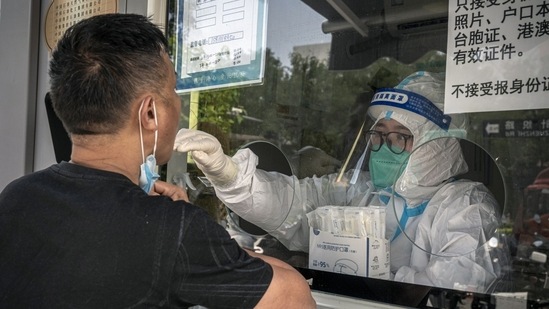China's Covid test diagnostic firms are owed billions in unpaid bills, fear debt
In cities such as Beijing and Shanghai, which aren’t shut down, residents need to undertake PCR tests every three days in order to use public facilities or go to work.
Testing is a core part of China’s strategy to contain Covid, but companies that provide such services are finding it harder to get paid on time.

Also Read| China locks down city of 21 million residents after 157 Covid cases reported
Diagnostic firms say the testing blitz is draining their finances as customers take longer to pay their dues. There’s a growing risk some yet-to-be-paid bills will be written off as bad debt, said Hangzhou-based Dian Diagnostics Group Co., one of China’s largest Covid test providers.
The bill is rapidly growing. Eight of the largest listed virus-testing firms reported a combined 14.1 billion yuan ($2 billion) increase in accounts receivable as of June 30, or a gain of 73% from a year earlier, according to Bloomberg calculations. Among these companies, Shanghai Labway Clinical Laboratory Co. saw the biggest jump of 189%.
Why are Covid test firms in debt?
The delay in meeting payments underscores the mounting cost -- financially, economically and socially -- of President Xi Jinping’s strict approach to stopping the spread of omicron subvariants. China increasingly employs a combination of mass-testing and citywide lockdowns as cases crop up in every province. Even in cities such as Beijing and Shanghai, which aren’t shut down, residents need to undertake PCR tests every three days in order to use public facilities or go to work.
Also Read| 'It felt like my insides were crying': China Covid curbs hit youth mental health
Local governments -- which are responsible for covering the cost of mass-testing -- are facing a squeeze. Declining business activities are hurting fiscal revenue, while Covid-related spending is increasing. On top of testing, this expenditure includes the construction of quarantine centers and subsidies for heavy-hit business sectors. They are also targeting new drugs to limit serious illness.
“One presumptive reason is that the budget for PCR testing at the start of the year could be underestimated given the unexpected lockdowns that followed,” said Mia He, a health-care analyst at Bloomberg Intelligence. “This may lead to delayed payment for test makers.”
Growing size of payments owed- top concern in financial reports
Testing companies named the growing size of payments owed as among their top concerns in their latest financial reports.
Dian Diagnostics is due 10.7 billion yuan, up from 5.4 billion yuan a year earlier, according to its first-half earnings report, which said the increase “poses risks of bad debt.” Guangzhou Kingmed Diagnostics Group Co. warned in its financial report that settlement of some testing fees may be delayed, adding that the Covid situation could exacerbate poor management by some private medical institutions and clinics, increasing the potential for bad debt.
Shanghai Runda Medical Technology Co. listed growing accounts receivable as one of the firm’s major risks. The company is seeing “longer periods to receive payments from clients and is facing increasing pressure on this,” it said in its earnings report.
Investors have taken note. Shanghai Labway shares trade near their lowest level since March. The company attributed the reason for its negative net cash flow in operation activities due to costs related to the lengthy payment period of Covid lab tests, according to its financial statement. Dian Diagnostics has fallen 15% since its high in May. Kingmed Diagnostics this week closed at a more than two-year low.
Beijing's aggressive approach to curb Covid
Such pressure is likely to intensify as China takes a more aggressive approach to curbing the spread of the virus. Some 33 cities have been fully or partially locked down in the current outbreak, according to a report by local media Caixin. More than 65 million residents have been caught in the flareup, the publication said.
Faced with limited budgets, health officials are also trying to stretch their finances and may be prioritizing funding in development and manufacturing of Covid drugs over PCR tests this year, as anti-viral drugs are the last defense line against the severity of virus infection, Bloomberg Intelligence’s He said.
In the first half of the year, national public revenue fell 10.2% from a year earlier, while public expenses rose 5.9%. Expenditure on health care increased 7.7%. Beijing spent 24% more to support Covid prevention measures, and Shanghai “accelerated payment” to key projects including Covid prevention.
‘Unlikely diagnostic firms will fail to receive payment for their services’
Still, given the importance of mass-testing to China’s Covid-Zero policy, and the ability of Beijing to backstop local governments as needed, it’s unlikely diagnostic firms will fail to receive payment for their services -- even if delays mount.
Local governments should be under pressure to pay testing companies in a timely manner, depending on their financial resources, said Jialin Zhang, an analyst at Nomura Holdings Inc.
“Nonetheless, it’s hard to predict when the bad debt risk could shrink since it depends on Covid cases, authorities’ attitude, and availability of other technology and Covid drugs,” Zhang said.






